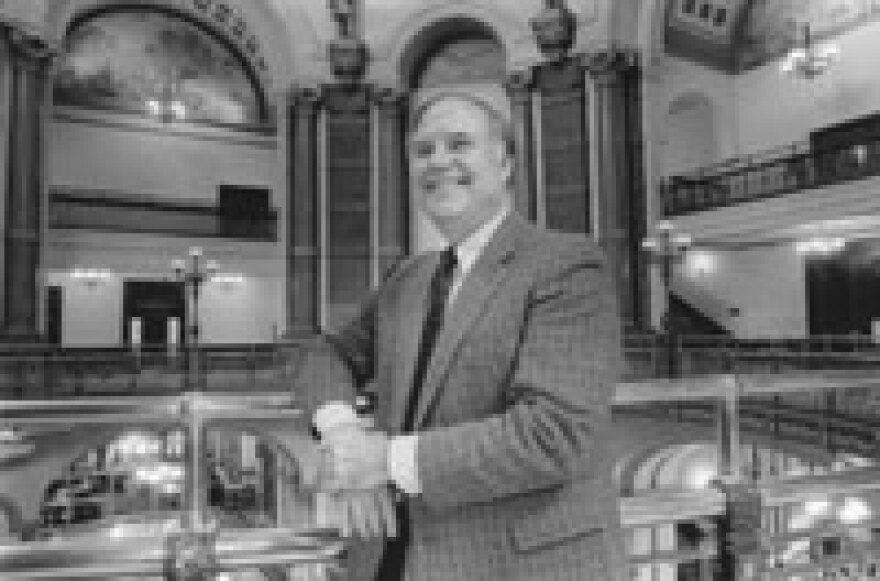Cal Skinner is trying to do something no one has ever accomplished — become the first person elected governor of Illinois as a third-party candidate.
Since statehood in 1818, every Illinois governor has been a Democrat or a Republican, a tradition Democrat Rod Blagojevich and Republican Jim Ryan are battling to continue.
But Skinner, a former Republican state representative turned Libertarian, hopes to crack the duopoly this November with the support of Illinois voters disgruntled by the record of what he calls the “power parties” on key issues.
His targets include:
- Taxpayers. Skinner says he’s the only candidate voters can trust to veto tax increases and cut state spending. He argues that Blagojevich’s Democratic supporters would want more dollars for programs they favor, while Ryan would be following a quarter-century of GOP governors who pledged not to raise taxes, but did. Neither offered any budget-cutting specifics during the spring legislative session, he adds, while Gov. George Ryan and lawmakers were wrestling with the state’s $1-billion-plus budget shortfall. Skinner makes one exception to his no-tax-hike pledge: levies on riverboat gambling. “I don’t care if you tax casinos at 100 percent, with all the implications that would have,” he says.
- Smokers. The two major parties have been kicking cigarette smokers around for the last decade or more, Skinner contends, with the latest affront a 40-cent increase in the state tax on a pack of cigarettes signed into law in June. Both Blagojevich and Ryan were “missing in action” during the cigarette tax debate this spring, he argues. Moreover, Blagojevich proposed raising those taxes to pay for prescription drugs for low-income seniors, Skinner notes, while Ryan as attorney general signed Illinois on to the national tobacco settlement Skinner claims has raised cigarette prices.
- Tollway users. Skinner pledges to make the toll roads into freeways, paying off tollway bonds with gasoline taxes paid by tollway drivers and covering operating costs with federal highway aid Illinois receives for toll roads. The toll highway authority currently gets none of the money; instead, the dollars are used for other state and local purposes. “Since the 1950s, people using the tollways have been paying twice,” Skinner says. “It’s only fair to free the ‘toll tax slaves.’”
- Gun owners. While Blagojevich and Ryan vie for gun control laurels, Skinner is a staunch advocate of Second Amendment rights, including legislation that would allow people to carry concealed weapons. “Imagine how much safer you would feel if every criminal had to worry that his next victim might be his last,” he says.
- Government reformers. Skinner lays much of the blame for the state’s fiscal and ethical difficulties at the doorsteps of the four legislative leaders whose main concern, he says, is staying in power.
As a remedy, Skinner is pushing term limits for leaders via a constitutional amendment that would put a six-year cap on leadership stints.
Skinner faces an uphill battle, of course, with neither the money — he had raised about $13,000 and had roughly $6,400 left as of June 30, compared to Blagojevich’s $3.8 million and Ryan’s $690,000 — nor the media attention that goes to the Democratic and Republican candidates.
But he already cleared one hurdle when GOP officials dropped their challenge to the Libertarians’ nominating petitions. Four years ago, Republicans succeeded in knocking the Libertarian slate off the ballot, but this time Libertarians did a better job of collecting valid signatures.
Now, Skinner’s immediate goal is to reach the 5 percent mark in media polls to claim a spot in the upcoming gubernatorial debates. Part of his problem is that the samples reported so far have listed only Blagojevich and Ryan, but make no mention of Skinner, whose ballot status was unclear for much of the summer.
Any support Skinner gains likely will come at Ryan’s expense from conservatives who would never vote for the more liberal Blagojevich, but might find the Libertarian message appealing. State Sen. Patrick O’Malley pulled 28 percent of the GOP primary vote for governor in March with positions akin to Skinner’s.
That prospect is a headache for Ryan, who trails Blagojevich badly in the polls. The Democrat’s standing is due in part to the GOP’s tarred image as a result of federal racketeering indictments of George Ryan’s campaign committee, his former chief of staff and other political allies, all coming in the wake of the bribes-for-licenses scandal during Ryan’s tenure as secretary of state.
But the public corruption playing field could be leveled in the coming weeks. U.S. Attorney Patrick Fitzgerald has indicted Michael Segal, an insurance executive with close ties to Chicago Democrats, and has other party heavies under scrutiny. Indictments of Democrats could lead voters to conclude both major parties are tainted, narrowing the gap between Blagojevich and Ryan and perhaps opening the door for the Libertarian.
Although third-party candidates have garnered less than 2 percent of the vote in the last three gubernatorial elections, Skinner takes heart from the example of Minnesota Gov. Jesse Ventura. The former pro wrestler’s independent candidacy was polling in single digits in September 1998, but he won a three-way race with 37 percent of the vote in November.
“The question is, have the people of the state of Illinois had enough yet?” Skinner asks. “If not this year, they never will.”
Charles N. Wheeler III is director of the Public Affairs Reporting program at the University of Illinois at Springfield.
Illinois Issues, September 2002






